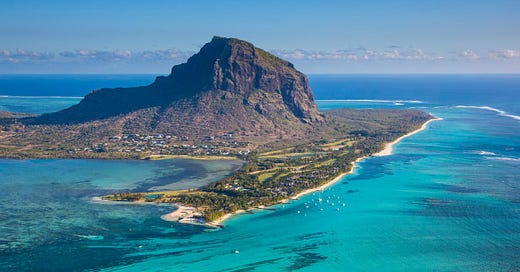The Mauritius Miracle
What a tiny African nation can teach us about economic growth, comparative advantage, and good governance.
The year is 1961 and, as Oxford economist James Meade writes,
“Mauritius is a small isolated island lying far out in the Indian Ocean off the east coast of Africa. It is the outstanding example of a monocrop economy. No less than 99% of her exports are sugar or direct by-products of sugar; and she relies upon imports for the vast majority of her foodstuffs, clothing, other consumption goods, raw materials and capital equipment.”
Mauritius is a small agrarian island with a pernicious history of imperialist resource extraction. We all know how this story ends: long lasting poverty and a society with rigid inequality. Except that’s not how the story ends for Mauritius. Over the next 50 years this island nation would grow its GDP per capita at 4% a year, diversify its economy, all while doubling its population. Today, Mauritius is one of the most prosperous and progressive African nations. Burgeoning financial and telecommunications sectors have cemented Mauritius as an entrepôt between Asia and Africa, and strong democratic institutions secure its future as a high income nation. How did Mauritius turn itself around and defy the historical trends that still grip Africa today?
Unlike many of its peer countries who attempted development through import substitution and large public works, Mauritius used economic liberalization, stable, transparent governance, and a comparative advantage in labor to attract investment.
In 1970 Mauritius unveiled the centerpiece of its strategy: the EPZ or export processing zone. This is basically a package of policies that create favorable conditions for businesses to station their labor intensive manufacturing processes in Mauritius. The main fiscal incentives are income tax relief and exemptions from customs duties on EPZ-related imports and exports. Additionally, profits and dividends can be freely repatriated, and capital brought into Mauritius may be freely taken out. Mauritius set up a free market for export oriented business, neither protecting nor harming businesses. Firms can keep their gains, but they also have to face their losses. Mauritius also managed to turn its high population growth from a detriment to a benefit. Rather than trying to artificially prop up wages with price floors, Mauritius used its low wage rate to attract labor intensive manufacturing. This advantage in labor is furthered by the low opportunity cost faced by workers in Mauritius. At the introduction of the EPZ the only other major employer were sugar farms, meaning Mauritius had a comparative advantage to specialize in labor intensive production.
The strategy was a resounding success. According an IMF report on the recent economic history of Mauritius:
After 20 years, it is clear that the Mauritian EPZ has assisted growth and development. The special zone now accounts for more than 60 percent of total exports, more than 30 percent of total employment, and more than 85 percent of total foreign direct investment.
The report continues, highlighting the positive effects of EPZ growth
In fact, the surge in EPZ employment translated not only into a reduction of unemployment but also into stiff competition for workers, and consequently, rising wages
These rising wages have contributed to a shrinking Gini coefficient, which fell from 45.7 to 38.9 between 1980 and 2006, and a strong tax base which the government has used to fund public goods projects such as free education and healthcare for its citizens.
Mauritius’ policy of economic liberalization has not only brought prosperity to its people, it also paves a way forward for all other nations. Even if you have little to no natural resources, an isolated geographic position, and a low skill labor force, economic liberalization provides a path for growth. Simply taking down barriers and letting the price signals of unemployed resources create firms which use them is all a state needs to do to create prosperity in its lands. The growth of Mauritius is an incredible achievement, but it is no miracle. Instead, it is the reliable, replicable result of allowing markets to allocate resources and profits.




How replicable is this for other similar countries? Other African countries?